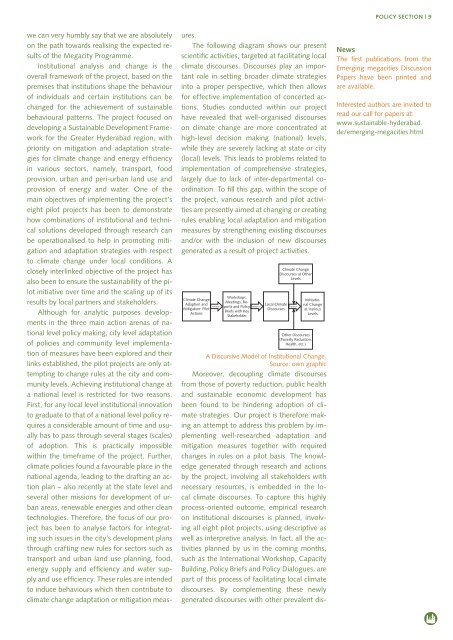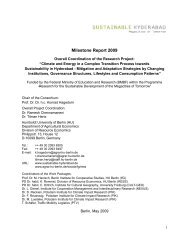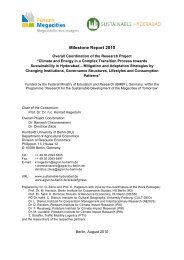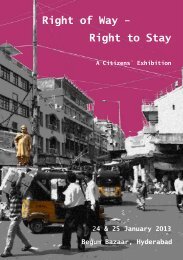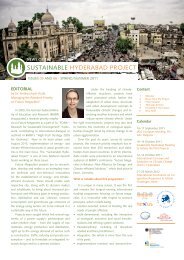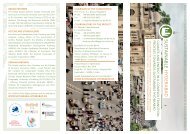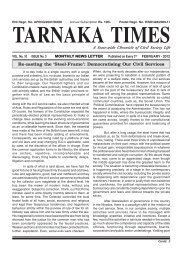SUSTAINABLE HYDERABAD PROJECT
SUSTAINABLE HYDERABAD PROJECT
SUSTAINABLE HYDERABAD PROJECT
Create successful ePaper yourself
Turn your PDF publications into a flip-book with our unique Google optimized e-Paper software.
POLICY SECTION | 9<br />
we can very humbly say that we are absolutely<br />
on the path towards realising the expected results<br />
of the Megacity Programme.<br />
Institutional analysis and change is the<br />
overall framework of the project, based on the<br />
premises that institutions shape the behaviour<br />
of individuals and certain institutions can be<br />
changed for the achievement of sustainable<br />
behavioural patterns. The project focused on<br />
developing a Sustainable Development Framework<br />
for the Greater Hyderabad region, with<br />
priority on mitigation and adaptation strategies<br />
for climate change and energy efficiency<br />
in various sectors, namely, transport, food<br />
provision, urban and peri-urban land use and<br />
provision of energy and water. One of the<br />
main objectives of implementing the project’s<br />
eight pilot projects has been to demonstrate<br />
how combinations of institutional and technical<br />
solutions developed through research can<br />
be operationalised to help in promoting mitigation<br />
and adaptation strategies with respect<br />
to climate change under local conditions. A<br />
closely interlinked objective of the project has<br />
also been to ensure the sustainability of the pilot<br />
initiative over time and the scaling up of its<br />
results by local partners and stakeholders.<br />
Although for analytic purposes developments<br />
in the three main action arenas of national<br />
level policy making, city level adaptation<br />
of policies and community level implementation<br />
of measures have been explored and their<br />
links established, the pilot projects are only attempting<br />
to change rules at the city and community<br />
levels. Achieving institutional change at<br />
a national level is restricted for two reasons.<br />
First, for any local level institutional innovation<br />
to graduate to that of a national level policy requires<br />
a considerable amount of time and usually<br />
has to pass through several stages (scales)<br />
of adoption. This is practically impossible<br />
within the timeframe of the project. Further,<br />
climate policies found a favourable place in the<br />
national agenda, leading to the drafting an action<br />
plan – also recently at the state level and<br />
several other missions for development of urban<br />
areas, renewable energies and other clean<br />
technologies. Therefore, the focus of our project<br />
has been to analyse factors for integrating<br />
such issues in the city’s development plans<br />
through crafting new rules for sectors such as<br />
transport and urban land use planning, food,<br />
energy supply and efficiency and water supply<br />
and use efficiency. These rules are intended<br />
to induce behaviours which then contribute to<br />
climate change adaptation or mitigation measures.<br />
The following diagram shows our present<br />
scientific activities, targeted at facilitating local<br />
climate discourses. Discourses play an important<br />
role in setting broader climate strategies<br />
into a proper perspective, which then allows<br />
for effective implementation of concerted actions.<br />
Studies conducted within our project<br />
have revealed that well-organised discourses<br />
on climate change are more concentrated at<br />
high-level decision making (national) levels,<br />
while they are severely lacking at state or city<br />
(local) levels. This leads to problems related to<br />
implementation of comprehensive strategies,<br />
largely due to lack of inter-departmental coordination.<br />
To fill this gap, within the scope of<br />
the project, various research and pilot activities<br />
are presently aimed at changing or creating<br />
rules enabling local adaptation and mitigation<br />
measures by strengthening existing discourses<br />
and/or with the inclusion of new discourses<br />
generated as a result of project activities.<br />
Climate Change<br />
Adaption and<br />
Mitigation: Pilot<br />
Actions<br />
Generate<br />
Workshops,<br />
Meetings, Reports<br />
and Policy<br />
Briefs with Key<br />
Stakeholder<br />
Embed in<br />
Local Climate<br />
Discourses<br />
Climate Change<br />
Discourses at Other<br />
Levels<br />
Produce<br />
Institutional<br />
Change<br />
at Various<br />
Levels<br />
Other Discourses<br />
(Poverty Reduction,<br />
Health, etc.)<br />
A Discursive Model of Institutional Change.<br />
Source: own graphic<br />
Moreover, decoupling climate discourses<br />
from those of poverty reduction, public health<br />
and sustainable economic development has<br />
been found to be hindering adoption of climate<br />
strategies. Our project is therefore making<br />
an attempt to address this problem by implementing<br />
well-researched adaptation and<br />
mitigation measures together with required<br />
changes in rules on a pilot basis. The knowledge<br />
generated through research and actions<br />
by the project, involving all stakeholders with<br />
necessary resources, is embedded in the local<br />
climate discourses. To capture this highly<br />
process-oriented outcome, empirical research<br />
on institutional discourses is planned, involving<br />
all eight pilot projects, using descriptive as<br />
well as interpretive analysis. In fact, all the activities<br />
planned by us in the coming months,<br />
such as the International Workshop, Capacity<br />
Building, Policy Briefs and Policy Dialogues, are<br />
part of this process of facilitating local climate<br />
discourses. By complementing these newly<br />
generated discourses with other prevalent dis-<br />
News<br />
The first publications from the<br />
Emerging megacities Discussion<br />
Papers have been printed and<br />
are available.<br />
Interested authors are invited to<br />
read our call for papers at:<br />
www.sustainable-hyderabad.<br />
de/emerging-megacities.html


